3 December, 2002
3 December, 2002
Delayed in McMurdo, Day 2
We're delayed again today from our field deployment,
but not so much by weather, but rather by an emergency
med-evac. Apparently, someone here coming out of the
Dry Valleys experienced an aneurysm and had to be
evacuated to New Zealand. This tied up the C-130's and
has delayed us until tomorrow.
There could be much worse places to be stranded than
McMurdo. In fact, this has given each of us a chance
to see other types of research taking place here and a
chance to explore a little.
One of the things Nancy Chabot, the leader of our
team, pointed out when we got to McMurdo was that we
have a duty to act as ambassadors for the ANSMET
program. We got the opportunity to do so last night at
the McMurdo astronomy club meeting. Danny, Dante,
Scott, Carl, Cady, and I attended their weekly meeting
and got the chance to talk about what we do and answer
questions from the club members. It was a real treat
for me to brag about my students and the DCHS
astronomy club. I brought flyers describing the
All-Sky project and talked about how I have students
involved with that (for information, go to the Denver
Museum of Nature and web site, click on "Space
Science," then click "All-Sky camera project"). The
astronomy club members were very kind and made us feel
quite welcome.
Shortly after the meeting, I had a fascinating
conversation with Lynn Arnold, a teacher who is
working for Raytheon here in McMurdo. Lynn is a TEA
Associate and is a great point of contact for the
TEA's passing through McMurdo. She has taught all over
the world, but most recently in Ecuador and
Micronesia. She is taking this year off from teaching
for the opportunity to work in Antarctica. McMurdo is
full of interesting people who travel and work hard
just for the chance to go to Antarctica. Lynn cracked
me up when she mentioned that she turned down a cruise
to Antarctica years ago because she had no interest in
freezing down here. Now, she's considering wintering
over. This place has this effect on people and the
people make this a vibrant community.
Some of the most interesting work being done here is
the study of the marine biology, just below the sea
ice. Divers actually go into this sub-freezing water
to study the ecosystems that exist below. One might be
inclined to think that little exists below the ice,
but actually life is thriving. Some of the animals are
represented in the McMurdo aquarium, a room full of
holding tanks where these animals are being studied. I
was most impressed by the Antarctic cod which were
over 3 ft. long. However, I was also impressed by one
of the largest sea stars I've ever seen. The tanks
were also full of several other invertebrates
including urchins, chitins, and other mollusks. After
visiting the aquarium, Alan from the astronomy club
offered to show us the desalination plant. This is an
amazing marvel of chemistry and engineering. Prior to
1996, all of McMurdo's fresh water was produced by a
distillation process whereby sea water was heated and
the steam condensed and recaptured. This caused water
rationing due to its inefficiency. In 1996, a
reverse-osmosis filtration system was installed that
pumps sea water through a series of filters until
fresh water is produced. Alan actually opened a valve
right on the filter to let us taste the water. It was
delicious.
The water's acidity (pH) is adjusted and chlorine is
added before the water is sent to the buildings. It is
not an inexpensive solution. Each filter costs
$250,000. Earlier this year, tetrapods, (small marine
invertebrates similar to jellyfish), were getting
caught in the filters. A screen had to be set up where
the water is drawn from the sea to catch the tetrapods
before they got into the filters. They seem to have
the problem solved and there is plenty of fresh water
at McMurdo.
Tonight, our plans are flexible. There is talk of
volleyball, a trip to Willy Field (the landing strip
on Ross Island), or watching football. We will try
again tomorrow to get out to our field site.
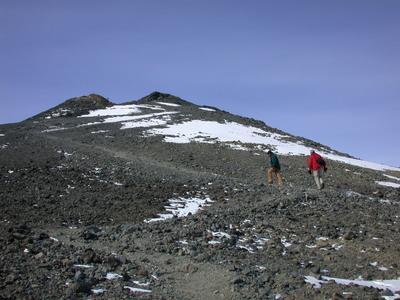
Andy Caldwell and Dante Lauretta climbing Ob Hill (photo by Daniel Glavin).
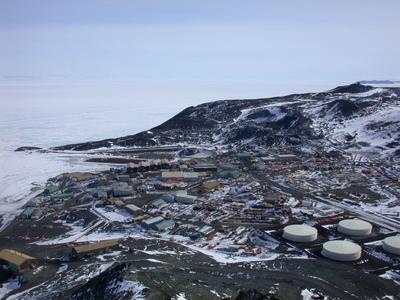
McMurdo Station from the top of Ob Hill (photo by Daniel Glavin).
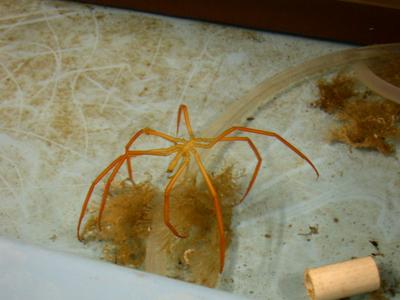
Spider Crab at McMurdo aquarium (photo by Daniel Glavin).
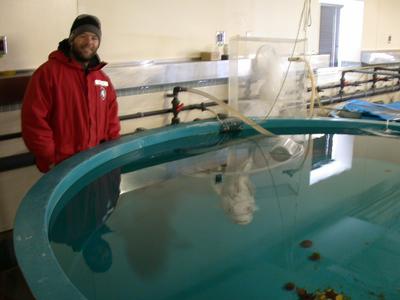
Danny Glavin impressed by size of Antarctic Cod.
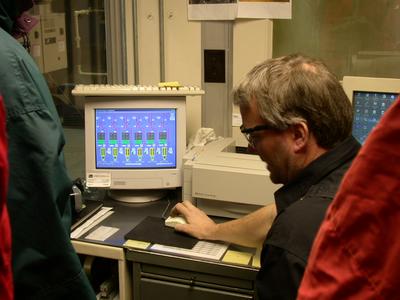
Alan explaining the process of desalination (photo by Daniel Glavin).
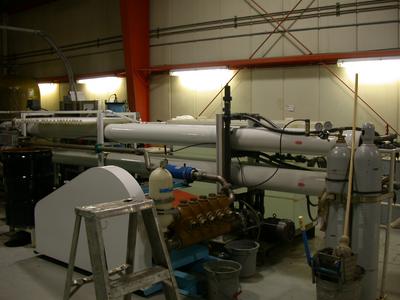
Reverse osmosis filters for producing fresh water from sea water (photo by Daniel Glavin).
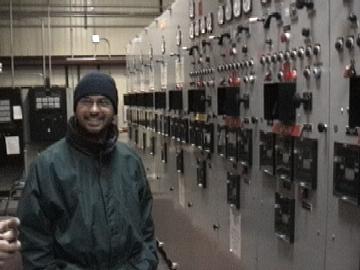
Dante Lauretta concocting his evil plan to take over Antarctica (or maybe simply impressed by the technology it takes to keep McMurdo warm and running).
Contact the TEA in the field at
.
If you cannot connect through your browser, copy the
TEA's e-mail address in the "To:" line of
your favorite e-mail package.
|
